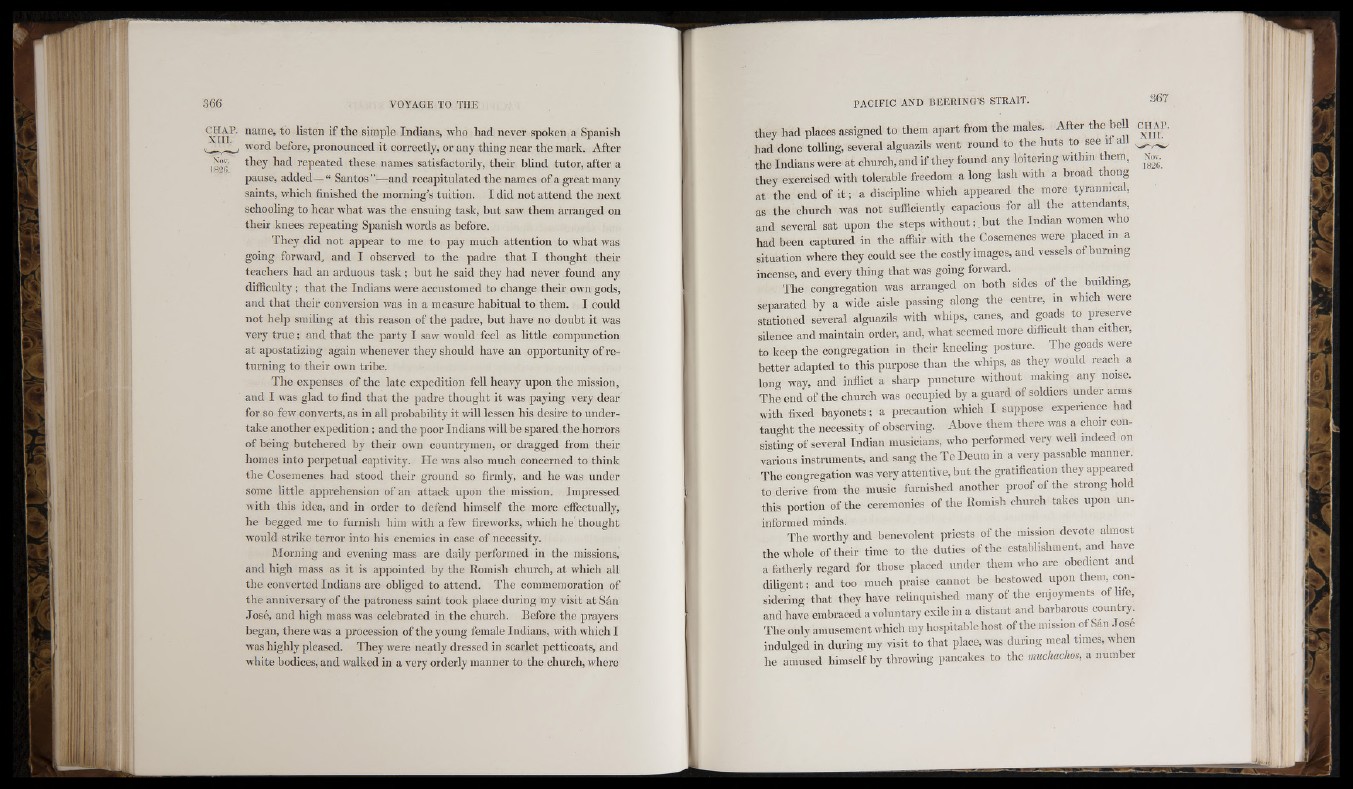
¡iii:
iì:;h
m i):
ì. ■
•î'to.
Xov.
1826.
J
111 II
CHAr. name, to listen if the simple Indians, who had never spoken a Spanish
word before, pronounced it correctly, or any thing near the mark. After
they had repeated these names satisfactorily, their blind tutor, after a
pause, added—“ Santos”—and recapitulated the names of a great many
saints, whicli finished the morning’s tuition. I did not attend the next
schooling to hear what was the ensuing task, but saw them arranged on
their knees repeating Spanish words as before.
They did not appear to me to pay much attention to what was
going forward, and I observed to the padre that I thought their
teachers had an arduous task ; but he said they had never found any
difficulty ; that the Indians were accustomed to change their own gods,
and that their conversion was in a measure habitual to them. I could
not help smiling at this reason of the padre, but have no doubt it was
very true ; and that the party I saw would feel as little compunction
at apostatizing again whenever they should have an opportunity of returning
to their own tribe.
The expenses of the late expedition fell heavy upon the mission,
and I was glad to find that the padre thought it was paying very dear
for so few converts, as in all probability it will lessen his desire to undertake
another expedition ; and the poor Indians will be spared the horrors
of being butchered hy their own countrymen, or dragged from their
homes into perpetual captivity. He was also much concerned to think
the Cosemenes had stood their ground so firmly, and he was under
some little apprehension of an attack upon the mission. Impressed
with this idea, and in order to defend himself the more effectually,
he begged me to furnish him with a few fireworks, which he thought
would strike terror into his enemies in case of necessity.
Morning and evening mass are daily performed in the missions,
and high mass as it is appointed by the Komish church, at which all
the converted Indians are obliged to attend. The commemoration of
the anniversary of the patroness saint took place during my visit at Sán
José, and high mass was celebrated in the church. Eefore the prayers
began, there was a procession of the young female Indians, with which I
was highly pleased. They were neatly dressed in scarlet petticoats, and
white bodices, and walked in a very orderly manner to the church, where
they had places assigned to them apart from the males. After ^ J C^HAP.
had done tolling, several alguazils went round to the huts to see il all
the Indians were at church, and if they found any loitering within them,
Nov.
1826.
they exercised with tolerable freedom a long lash with a broad thong
at the end of it ; a discipline which appeared the more tyrannical,
as the church was not sufficiently capacious for all the attendants,
and several sat upon the steps without;,but the Indian women who
had been captured in the affair with the Cosemenes were placed in a
situation where they could see the costly images, and vessels of burning
incense, and every thing that was going forward.
The congregation was arranged on both sides of the building,
separated by a wide aisle passing along the centre, m which were
stationed several alguazils with whips, canes, and goads to preserve
silence and maintain order, and, what seemed more difficult than either,
to keep the congregation in their kneeling posture. The goads were
better adapted to this purpose than the whips, as they would reach a
lono- way, and inflict a sharp puncture without making any noise.
The end of the church was occupied by a guard of soldiers under arms
with fixed bayonets; a precaution which I suppose experience had
taught the necessity of observing. Above them there was a choir consistili
"■ of several Indian musicians, who performed very well indeed on
various instruments, and sang the Te Deum in a very passable maniieire
The congregation was very attentive, but the gratification they appeare
to derive from the music furnished another proof of the stronghold
this portion of the ceremonies of the Eomish church takes upon uninformed
minds.
The worthy and benevolent priests of the mission devote almost
the whole of their time to the duties of the establishment, and have
a fatherly regard for those placed under them who are obedient and
dilio-cnt; and too much praise cannot be bestowed upon them, considerine
that they have relinquished many of the enjoyments of life,
and have embraced a voluntary exile in a distant and barbarous country.
The only amusement which my hospitable host of the mission ol Sán Jose
indulged in during my visit to that place, was during meal times, when
he amused himself by throwing pancakes to the muchachos, a numhev